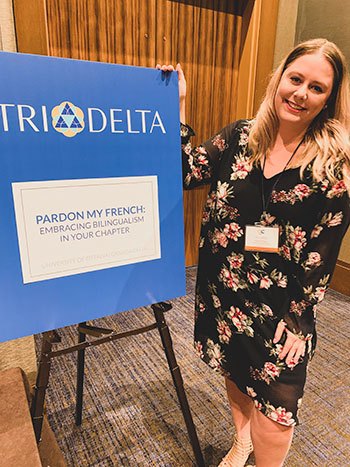“Bring You” means allowing Tri Deltas to be their authentic selves, celebrating what makes up their identity. “Language is also a large part of our identities, says Mélanie Olsen, Ottawa, who serves her collegiate chapter as the bilingual chair. “Speaking French is part of my identity and Tri Delta allows me to keep that intact.”
Diversity and inclusion within Tri Delta have numerous facets, and Canada Delta Chapter is actively making language an important part of inclusion for their collegiate experience. The University of Ottawa in Ottawa, Ontario, currently is the largest bilingual university in the world, with many students who are francophones (those whose first language is French). The innovative university offers the same classes in both English and French and many students learn both languages as part of their time in university, as it becomes necessary for transitions into careers with Parliament and other areas of the Canadian government.
As a francophone, Mélanie has been able to expand her horizons through her time at Ottawa and challenge the boundaries of inclusion within her chapter. “Growing up in Quebec, French is mostly spoken, but we learned English at home as well,” she said. “I went to English camp, watched ‘Sesame Street’ and my anglophone (predominantly English-speaking people) friends helped as well.”
Through her membership in Tri Delta, she’s been welcomed by a chapter proud of its diversity and multiple languages, with members from Singapore, Ukraine, China, Europe, Canada and the United States. About a quarter of the chapter is fluent in French, as it’s not as prominent in other Provinces in the country. As the chapter began to welcome more francophone members, it developed an officer position dedicated to serving bilingual needs, making language and culture a priority.
“Our chapter is unique, and we aim to be inclusive for our sisters and for women who want to join,” Mélanie noted. “The francophones are still a minority, and we have to look to remove the barriers to allow for belonging when it comes to language.”
Sarah Torretta-Trout, Southeast Missouri, has been a French teacher in St. Louis, Missouri, for 17 years. She has seen an increase in U.S. students’ desire to understand language. And while students are eager to learn, they are apprehensive to practice because of the perceived need for perfection of fluency. Simply attempting to learn and practice allows anyone to push the bubble of their individual experience.
“The internet and social media remove so many borders and exposes younger generations to the larger world,” Sarah said. “There is a sign in my classroom that reads ‘Respect Begins with Understanding.’ The nuances of others’ lives come with an understanding of language and culture. Meeting people where they are and accepting them allows for more respect and personal growth, which exemplifies the Tri Delta experience.”
The bilingual chair at Canada Delta dedicates much of the role to recruitment and public relations efforts, including incorporating bilingual posts and translating communications for members and PNMs. Mélanie has seen that more information has been required in French so that members and potential members have greater clarity of the experiences Tri Delta offers within Canada Delta. She is currently in the process of translating chapter bylaws into French for clearer understanding and operations.
She has also begun more social programming for members, including Delta Dates where sisters are paired up to help bridge and learn each other’s languages. Members are eager to learn, and there has been high participation from anglophone members. For the dates, they are provided practice points such as greetings, ordering at restaurants and asking for directions so that they may feel independent in French settings. The chapter has even taken trips into Quebec for total French immersions.

Mélanie presented her work as bilingual chair at Collegiate Leadership Conference 2019 as part of the Delta Demos in an exhibit she called “Pardon My French.” She was able to share her experiences with other chapters and members who were interested in developing more inclusive practices for their international members.
“It’s my hope that more Tri Delta chapters take the initiative to prioritize their diverse members and focus on kindness through the sense of belonging. That has allowed me to bring my Tri Delta family to see the important parts of my identity and my world.”

